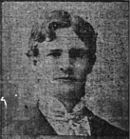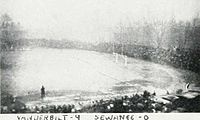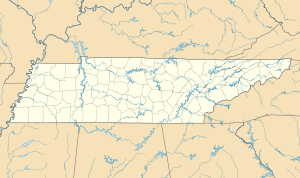Sewanee–Vanderbilt football rivalry
| Sport | Football |
|---|---|
| First meeting | November 7, 1891 Vanderbilt 22, Sewanee 0 |
| Latest meeting | November 23, 1944 Vanderbilt 28, Sewanee 7 |
| Next meeting | Series defunct after Sewanee downgraded to D-III School |
| Statistics | |
| Meetings total | 52 |
| All-time series | Vanderbilt, 40–8–4 |
| Largest victory | Vanderbilt, 68–4 (1905) |
| Longest win streak | Vanderbilt, 14 (1925–1941) |
| Current win streak | Vanderbilt, 1 (1944) |
Locations in Tennessee | |
The Sewanee–Vanderbilt football rivalry was an American college football rivalry[1] between the Sewanee Tigers and Vanderbilt Commodores. They were both founding members of the Southern Intercollegiate Athletic Association (SIAA), the Southern Conference, and the Southeastern Conference (SEC). Both teams' histories feature some powerhouses of early Southern football, e.g. 1899 Sewanee Tigers football team and 1906 Vanderbilt Commodores football team. It was the oldest of Vanderbilt's rivalries; dating back to 1891 when Vanderbilt played its second ever football game and Sewanee played its first.[1] Vanderbilt leads the series 40–8–4.[2] It used to be claimed as the oldest rivalry in the south,[3] older than the "South's Oldest Rivalry" between North Carolina and Virginia. Usually played towards the end of the season on Thanksgiving Day, the two teams have not met again since 1944.
The two universities are in the same state of Tennessee and are over 90 miles away from each other. A newspaper account of the rivalry reads: "Both schools look upon the game as the big feature of their schedule each year, no matter what other games are included, and it is always the biggest drawing card on either schedule."[4] "Goodbye Sewanee goodbye" was even a song sung by Vanderbilt students.[5]
Game results
| Sewanee victories | Vanderbilt victories | Tie games |
| |||||||||||||||||||||||||||||||||||||||||||||||||||||||||||||||||||||||||||||||||||||||||||||||||||||||||||||||||||||||||||||||||||||||||||||||||||||||||||||||||||||||||||||||||||||||||||||||||||||||||||||||||||||||||||||||||||||||||||||||||||||||||||||||||||||||||||||||||||||||
Notable games
1891: Sewanee's first game; Vanderbilt's second
Sewanee's first ever football game, and Vanderbilt's second, was the first instance of this rivalry at McGee Field on November 7, 1891. Vanderbilt won 22 to 0. McGee Field is the oldest stadium in the south still in use, and the fourth oldest in the nation.[6]
1897: Vanderbilt gives Sewanee Hell
Vanderbilt beat Sewanee 10–0. A shocking event occurred in 1897 at the Thanksgiving Day match with Sewanee on the original Dudley Field. The word "hell" had been used in the line of a popular cheer on campus by Vanderbilt students and spread into events as football. This caused uproar with the university administration and the city of Nashville.
Both teams commenced to pass the ball around for the purpose of limbering up. Throughout this preliminary the students of both colleges gave their respective yells and sung their several songs written for the occasion. There was one yell given with great frequency by the Vanderbilt students which was very offensive to decent people. It starts off "Hippity Huz, Hippity Huz; What in the hell is the matter with us." It had become so popular at Vanderbilt that it was in the minds and causes them to be oblivious to the fact that it was not exactly proper to shock refined ladies by such utterances.

Phil Connell and captain Howard Boogher dove to recover the ball after the victory, giving Vanderbilt its first conference title.
1899: Sewanee's greatest team; no game with Vanderbilt
Sewanee manager Luke Lea, after a disagreement with Vanderbilt over gate receipts resulting in the 1899 game being cancelled, sought a way to make up for the lost revenue. In response, Lea put together an improbable schedule of playing five big name opponents in six days. Playing so many games in a short period minimized costs while maximizing revenue.[7] During this road trip, Sewanee outscored its opponents for a combined 91–0, including Texas, Texas A&M, LSU, and Ole Miss. Sewanee obliterated each one, traveling by train for some 2,500 miles. This feat, barring fundamental changes in modern-day football, can never be equaled.[8] Contemporary sources called the road trip the most remarkable ever made by an American college team.[9]

1902: Sewanee drubs Vandy
Sewanee defeated Vanderbilt in a surprising 11 to 5 upset.[10] John Edgerton's touchdown was the first Vanderbilt had scored on Sewanee since 1897. Captain Henry D. Phillips made Sewanee's touchdown.
1903: Vanderbilt upsets Sewanee
1903 met difficulty in determining an SIAA champion. Clemson's John Heisman pushed strongly for Cumberland to share the SIAA title with Clemson,[11] but also originally scheduled a game with the Vanderbilt-Sewanee winner to decide the conference.[12] Cumberland's strongest victory was its win over Vanderbilt.

John J. Tigert, later a prominent educator, got Vanderbilt's first touchdown, and thus was the first person to score on the Tigers all season.
1905: Vanderbilt drubs Sewanee
Vanderbilt crushed a strong Sewanee squad 68–4. One publication claims "The first scouting done in the South was in 1905, when Dan McGugin and Captain Innis Brown, of Vanderbilt went to Atlanta to see Sewanee play Georgia Tech."[13] John Scarbrough made Sewanee's only points on a 35-yard field goal.[14] On the dedication of Harris Stadium, one writer noted "The University of the South has numbered among its athletes some of the greatest. Anyone who played against giant Henry Phillips in 1901–1903 felt that he was nothing less than the best as guard and fullback. Anyone who ever saw a punt from the foot of J. W. Scarbrough."[15] Honus Craig once ran 60 yards for a touchdown.[14]
1907: Grantland Rice's Greatest Thrill
In the second year of the legal forward pass Vanderbilt won the SIAA championship on a double-pass play. Sewanee led 12 to 11 with twelve minutes to play. At McGugin's signal, the Commodores went into a freakish formation in which Stein Stone remained at center but all other players shifted to his left.[16] Quarterback Hugh Potts took the snap and lateraled the ball to Vaughn Blake, who lateraled it across to Bob Blake, who had lined up deep in punt formation, as Stone ran down the field.[16] Blake then connected with Stone on a 35-yard pass down inside the 5-yard line.[17][18] Honus Craig ran in it to win the game.[19] It was cited by Grantland Rice as the greatest thrill he ever witnessed in his years of watching sports.[20]


Vanderbilt coach Dan McGugin in Spalding's Football Guide's summation of the season in the SIAA wrote "The standing. First, Vanderbilt; second, Sewanee, a might good second;" and that Aubrey Lanier "came near winning the Vanderbilt game by his brilliant dashes after receiving punts."[21] Innis Brown recalled that Sewanee was likely the South's best team that year.[18]
1909: Sewanee's last SIAA title
Sewanee beat Vanderbilt 16–5, giving Vanderbilt its first loss to a Southern team in six years. and netting the SIAA championship for Sewanee. "Moise, for Sewanee, played the game of his life."[22]
1914: Tolley leads Tigers over Vanderbilt
Sewanee quarterback Lee Tolley was awarded a gold football charm to commemorate the 14 to 13 victory.[23] One account reads "For brilliance and beauty of execution, (Tolley's play) has had few equals, if any, in the South, and the Tiger leader retires from the game as the premier quarterback in the S.I.A.A., beyond a doubt." His performance included a 75-yard punt return for a touchdown.[24]
1921: Vanderbilt's muddiest game

The Commodores closed the season with a 9 to 0 win over Sewanee in the "muddiest game" in its history.[25] The Commodores were supposedly knee-deep in mud and water,[26] with players unrecognizable.[27] The two teams were considered a fairly even match before the game. Sewanee felt confident its line gave them a chance to win, but also a bit nervous about Vanderbilt's passing attack.[28] In a game for bragging rights and the Southern Intercollegiate Athletic Association title, Lynn Bomar would be injured.[29]
The game went scoreless until the fourth quarter, when Sewanee fumbled the snap on a punt and the punter was smothered by Jess Neely, Frank Godchaux, and Pink Wade for a safety. Later in the fourth, Hek Wakefield would punt the ball 54 yards from his own 38 yard-line, and Elam recovered a fumble by Sewanee's Powers. Wakefield ran in the game's only touchdown off-tackle from about 5 yards out. Wakefield kicked goal. Sewanee had more first downs than Vanderbilt, six to Vandy's two, but suffered four successive fumbles.[30][31]
1924: Sewanee's last and greatest victory
Sewanee won for the first time in a decade by the score of 16–0. The student newspaper The Sewanee Purple labeled it "The Greatest Victory for Sewanee in Its Thirty-one Years of Football History."[32] Vanderbilt coach Dan McGugin stated "Sewanee played a brilliant, sustained game. It was her day all the way." Michigan coach Fielding Yost said of the game, "It was one of those days when everything you try goes wrong and everything the other fellow tries goes right. Sewanee played great football." Gil Reese was relatively controlled and Bob Rives' line play was adequately challenged. Gil Reese and Fatty Lawrence starred for the Commodores. Sewanee's backfield of captain Harris, Gibbons, Barker, and Mahoney "clicked to perfection"[25] and its line received much praise as well.[32] It's the last time Sewanee has beaten Vanderbilt.
See also
References
- ^ a b William L. Traughber. "CHC- Sewanee Was Vandy's First Rival". Archived from the original on August 8, 2014. Retrieved August 6, 2014.
- ^ cf. William L. Traughber (2011). Vanderbilt Football: Tales of Commodore Gridiron History. History Press. p. 26. ISBN 9781609494230.
- ^ "Oldest Dual Series" (PDF).
- ^ "Ready For Big Game". The State. Columbia, South Carolina. November 19, 1920.
- ^ "Goodbye, Sewanee, Goodbye". Retrieved February 1, 2015.
- ^ "2004 Sewanee football media guide" (PDF). p. 43. Archived from the original (PDF) on March 9, 2013.
- ^ Rachel Zoll (November 27, 1999). "1899 Sewanee 'Iron Men' remembered". Herald-Journal.
- ^ cf. Rufus Ward (February 5, 2012). "Ask Rufus: The greatest football team ever". Archived from the original on April 17, 2016.
- ^ "Sewanee's Football Tour". The Daily Times. November 16, 1899. p. 3. Archived from the original on March 5, 2016. Retrieved November 6, 2015 – via Newspapers.com.

- ^ "Vanderbilt Is Given Drubbing". Atlanta Constitution. November 28, 1902. p. 1. Retrieved March 30, 2015 – via Newspapers.com.

- ^ Langum, David J (January 2010). From Maverick to Mainstream: Cumberland School of Law, 1847–1997. University of Georgia Press. p. 95. ISBN 9780820336183.
- ^ "Fine Football in Southland". The Courier-Journal. October 25, 1903. p. 25. Retrieved May 16, 2016 – via Newspapers.com.

- ^ George Allen (February 2009). How to Scout Football. Martino. p. 3. ISBN 9781578987290.
- ^ a b "Vanderbilt, Sewanee 4". The Courier-Journal. December 1, 1905. p. 7. Retrieved May 10, 2016 – via Newspapers.com.

- ^ "Stadium Has Harris Name" (PDF). The Sewanee Purple. November 6, 1957.
- ^ a b Edwin Pope (1956). Football's Greatest Coaches. p. 339.
- ^ "Claiming Rampant". The Miami News. February 9, 1954.
- ^ a b "Brown Calls Vanderbilt '06 Best Eleven South Ever Had". Atlanta Constitution. February 19, 1911. p. 52. Retrieved March 8, 2015 – via Newspapers.com.

- ^ Bill Traughber (December 5, 2007). "CHC: Stein Stone's Famous 1907 Catch".
- ^ "Grantland Rice Tells Of Greatest Thrill In Years Of Watching Sport". Boston Daily Globe. April 27, 1924. ProQuest 497709192.
- ^ Dan McGugin (1907). "Southern Intercollegiate Athletic Association Foot Ball". The Official National Collegiate Athletic Association Football Guide. National Collegiate Athletic Association: 71–75.
- ^ "Sewanee Wins Contest Easily". The Courier-Journal. November 26, 1909. p. 7. Retrieved May 8, 2016 – via Newspapers.com.

- ^ Wiedmer, Mark (January 18, 2015). "Century-old football charm proves you can go home again". Retrieved February 7, 2015.
- ^ "Tolley's Run Won Victory". Hopkinsville Kentuckian. November 28, 1914.
- ^ a b Russell, Fred, and Maxwell Edward Benson. Fifty Years of Vanderbilt Football. Nashville, TN, 1938, p.39, 43
- ^ "Vanderbilt Wins From Sewanee In Final Quarter, 9–0". Augusta Chronicle. November 25, 1921.
- ^ "Vanderbilt 9, Sewanee 0". Morning Oregonian. November 25, 1921.
- ^ "Gridiron Gossip". Montgomery Advertiser. November 10, 1921.
- ^ "Vanderbilt-Sewanee Clash is Big Even". Montgomery Advertiser. November 24, 1921.
- ^ Camp, Walter, ed. National Collegiate Athletic Association Football Rules: Official Intercollegiate Football Guide. 45 Rose St, New York: American Sports, 1922. Print. Spalding's Athletic Library.
- ^ "Final Period Rally Wins for Old Vandy". Charlotte Observer. November 25, 1921.
- ^ a b "Sewanee 16, Vandy 0". The Sewanee Purple. December 3, 1924. hdl:11005/1208.



